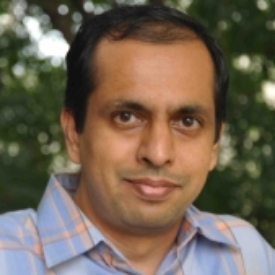| Course Status : | Completed |
| Course Type : | Core |
| Duration : | 12 weeks |
| Category : |
|
| Credit Points : | 3 |
| Level : | Undergraduate |
| Start Date : | 27 Jan 2020 |
| End Date : | 17 Apr 2020 |
| Enrollment Ends : | 03 Feb 2020 |
| Exam Date : | 25 Apr 2020 IST |
Note: This exam date is subjected to change based on seat availability. You can check final exam date on your hall ticket.
| Week | Unit contents |
| 1 | Course introduction; Need for nonlinear circuits; Incremental analysis of nonlinear circuits; Diode and its models; Incremental picture of a two port nonlinear circuit |
| 2 | Constraints on y-parameters and large signal characteristics to obtain a high gain; MOS transistor and its characteristics; AC coupling network to add signal to bias; AC coupling at input and output; Common source amplifier |
| 3 | Output conductance of a MOS transistor; Inherent gain limitation of a transistor; Sensitivity of gm to transistor parameters; Biasing a transistor at a constant current; Drain feedback configuration; Current mirror |
| 4 | Common source amplifier using drain feedback; Common source amplifier using current mirror bias |
| 5 | Common source amplifier using source feedback bias; Using a resistor instead of a current source for biasing; Further biasing techniques; VCVS using a transistor; Source follower biasing |
| 6 | CCVS using a transistor; CCVS using an opamp; Biasing a CCVS; Emitter degenerated amplifier |
| 7 | Common gate amplifier and its biasing; VCCS using a transistor and its biasing |
| 8 | pMOS transistor and its small signal model; Biasing a pMOS transistor; Converting nMOS circuits to pMOS; Amplifiers using a pMOS transistor |
| 9 | CS amplifier with active load; CMOS inverter |
| 10 | Differential pair with current mirror load; Single stage opamp |
| 11 | Two stage opamp; Compensation; Opamp models |
| 12 | Bipolar junction transistor-large and small signal models; BJT circuits- Biasing; Common source amplifier; Emitter follower |

DOWNLOAD APP
FOLLOW US